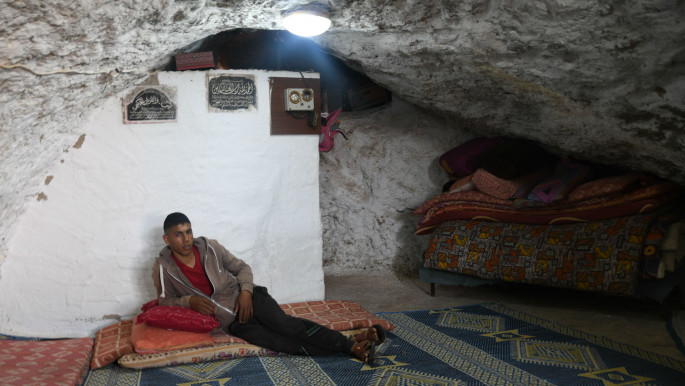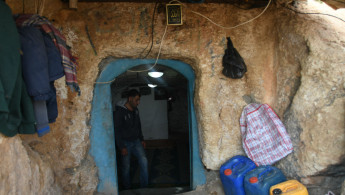Displaced Palestinians find refuge in West Bank caves
In 2016, the Israeli government destroyed the buildings and they continue to raid the area. But in the crevices of these hills are caves where displaced Palestinians live, and resist Israeli occupation.
Hundreds of Palestinians in Israeli-controlled Area C of the West Bank are living in caves. As Israel demolishes homes and restricts building permits, Palestinians have taken shelter in these caves around Nablus and Hebron, a city in the southern West Bank.
The governor of Hebron, Jibril al-Bakri, inaugurated five caves in the Ar-Rakeez area, east of the village of Yatta in February. This was the first time an official Palestinian body refurbished these caves.
Around 60 percent of the West Bank is labelled Area C. Here, Palestinians need a construction permit to build on their own land, but Israel rarely issues them. According to figures from Israeli human rights organisation B'Tselem, since 2006, nearly 1,500 Palestinian homes in the West Bank have been demolished – causing more than 6,500 people to become homeless.
 |
Since 2006, nearly 1,500 Palestinian homes in the West Bank have been demolished – causing more than 6,500 people to become homeless |  |
Arafat, 20, and his uncle, Yousef, 34, – who both requested their surnames not be used – grew up in the caves. Unlike the roughly 35 families living in these caves near Nablus, the pair’s home wasn’t destroyed by Israeli forces. They have a house in the nearby village, but stay in the caves to protect their land.
"The main reason we are living here is to keep the land, because if I leave the land, the settlers will take it," Yousef said. An Israeli settler community located on a mountain top is visible from Yousef and Arafat’s cave.
The seizures of land, cars, animals and equipment is a daily occurrence for cave residents.
 |
|
| Arafat lounges inside his cave [Delilah Boxstein] |
"Many times the military will tell us that they will take the area for one or two weeks for military reasons... They ask us to leave the land, and after one or two weeks tell us we can return," said Abu Lino, a public relations officer for Beit Furik Municipality, an area southeast of Nablus.
In November, the Israeli army took Yousef and Arafat's tent.
"If you put caravan or tent, they take it. But if you make building from concrete or cement, they demolish it," said Marouf Alrefai of the Colonisation and Wall Resistance Commission (CWRC). The CWRC is affiliated with the Palestine Liberation Organisation and helps renovate the caves.
Yousef and Arafat drive an illegal car they purchased for around 2,000 shekels. Their registered car was stolen by the Israeli army, so having a cheaper, illegal vehicle makes more sense amid the threat of theft.
When the military confiscates Palestinians' belongings or livestock, the families are forced to pay for the animals' food and housing while in Israeli captivity. And in order to have their items and livestock returned, they have to pay a fee to the Israeli government.
Palestinian journalist Mohammad Hamdan emphasised that in some cave communities, Palestinians face arrests.
"The army tells the settler 'Go there and make a problem with [the Palestinians],'" said Hamdan, explaining how the settlers will provoke the Palestinians and record them defending themselves and their land on camera.
"So when they go to the court, the settlers can then say 'Look at the people, they were violent,'" Hamdan said. The jailed Palestinians usually stay in prison for one or two months.
The CWRC, Palestinian governors, Palestinian Red Crescent Society, Red Cross, Council on American-Islamic Relations and other organisations provide financial and legal support when Israel seizes supplies, animals, makes arrests or attempts demolitions.
 |
They can kill me, but I will not leave the land |  |
Yousef and Arafat live a simple life in their cave dwelling. They source their water from a well above their home and store it in tanks. They don't have a shower but do have a toilet inside a steel box outside the cave's entrance.
Electricity is powered by solar panels installed by An-Najah National University in Nablus. Their furnishings are minimal with some colourful mats, pillows and geometric-printed rugs and a few plastic chairs outside.
They have a television with a satellite dish and internet access through a router. Heating and air conditioning are not necessary as the caves' natural insulation makes them cool in the summer and warm in the winter. Their home is surrounded by sheep, goats and even a dog, and the two make a living selling dairy and livestock in Nablus.
Yet some caves are much more luxurious living spaces as Alrefai describes them as "five-star hotels" equipped with furniture and bathrooms.
While these caves offer alternative housing to Palestinians pushed from their homes, the threat of land grabs and demolitions still looms.
Near the caves, a pile of rubble is all that’s left where a school once stood. Israeli forces tore it down twice in 2016. A new school was erected just down the road from the demolished one. Palestinian telecommunications provider Jawwal created a park for the area complete with olive trees and a pool. Settlers destroyed the park in 2016.
Yousef, though, remains defiant against the harassment. "They can kill me, but I will not leave the land," Yousef ends.
Follow us on Twitter and Instagram to stay connected



